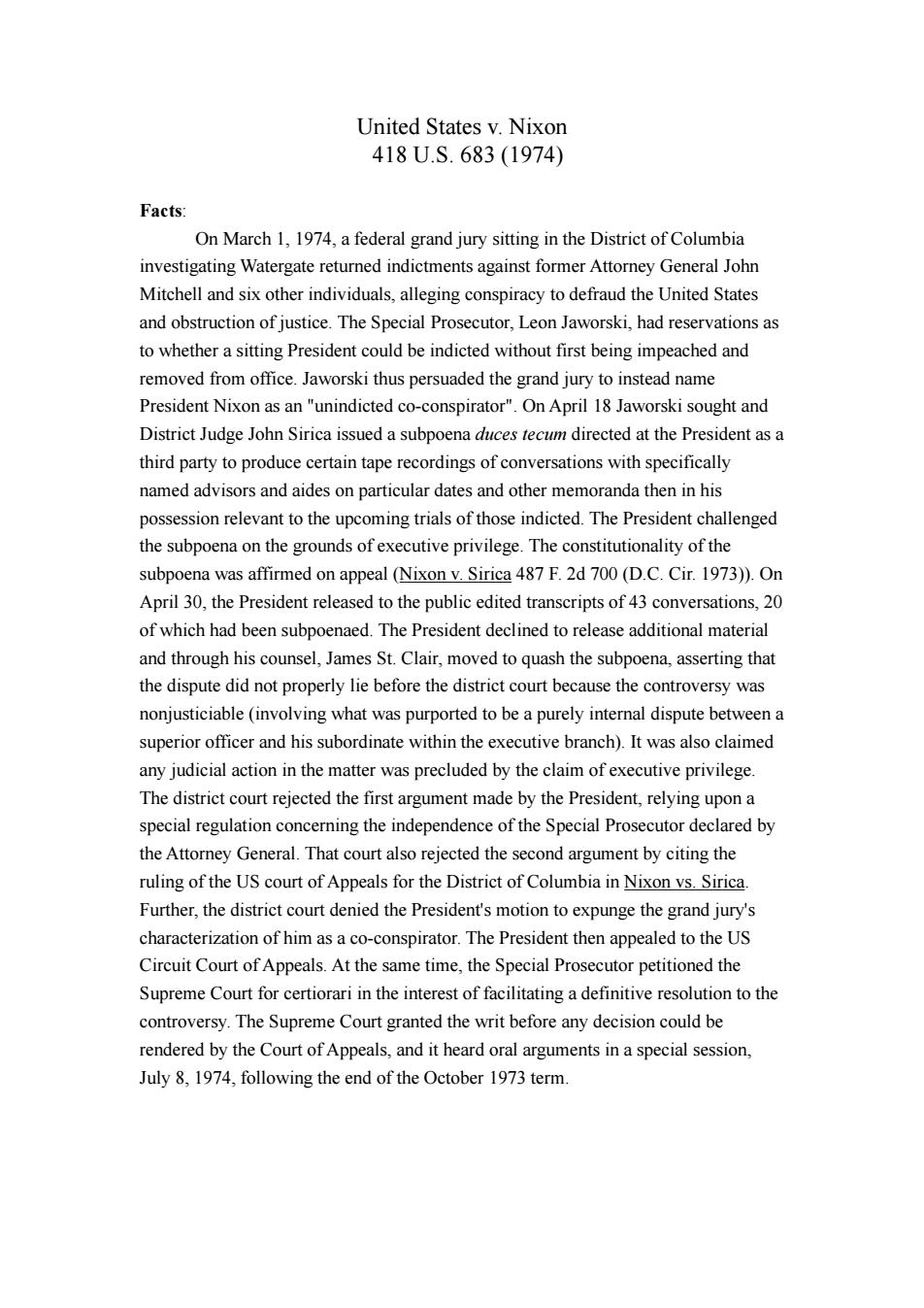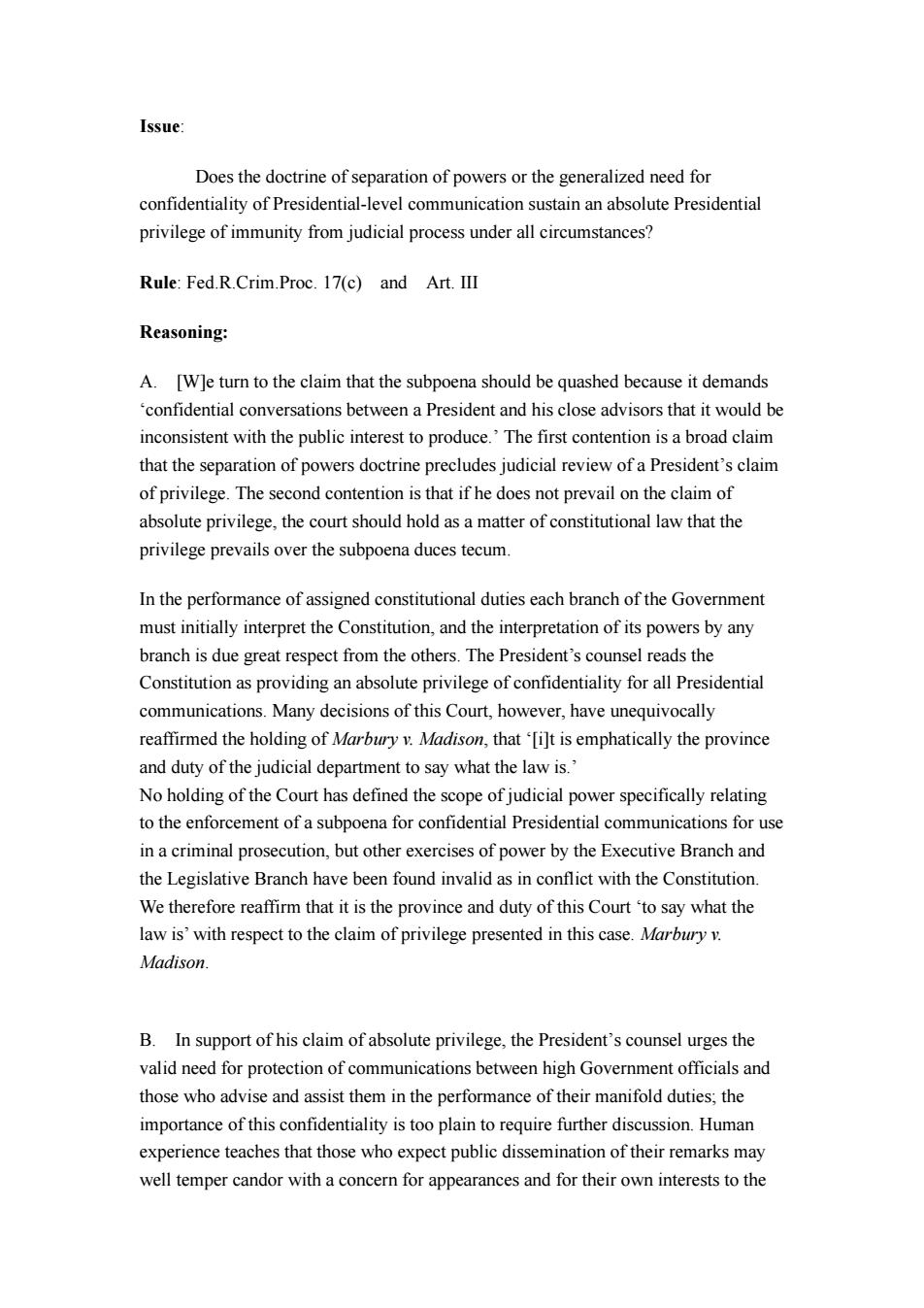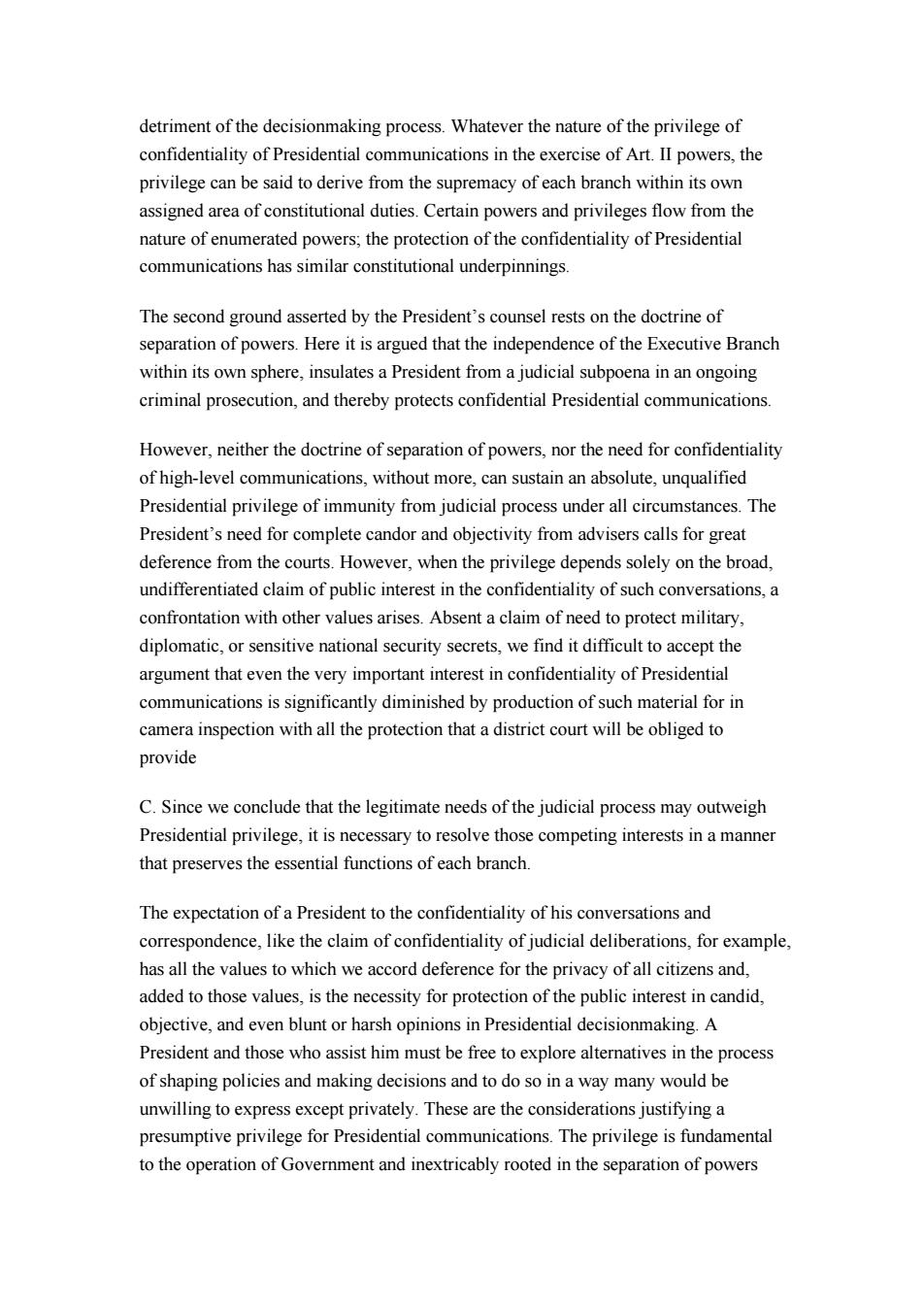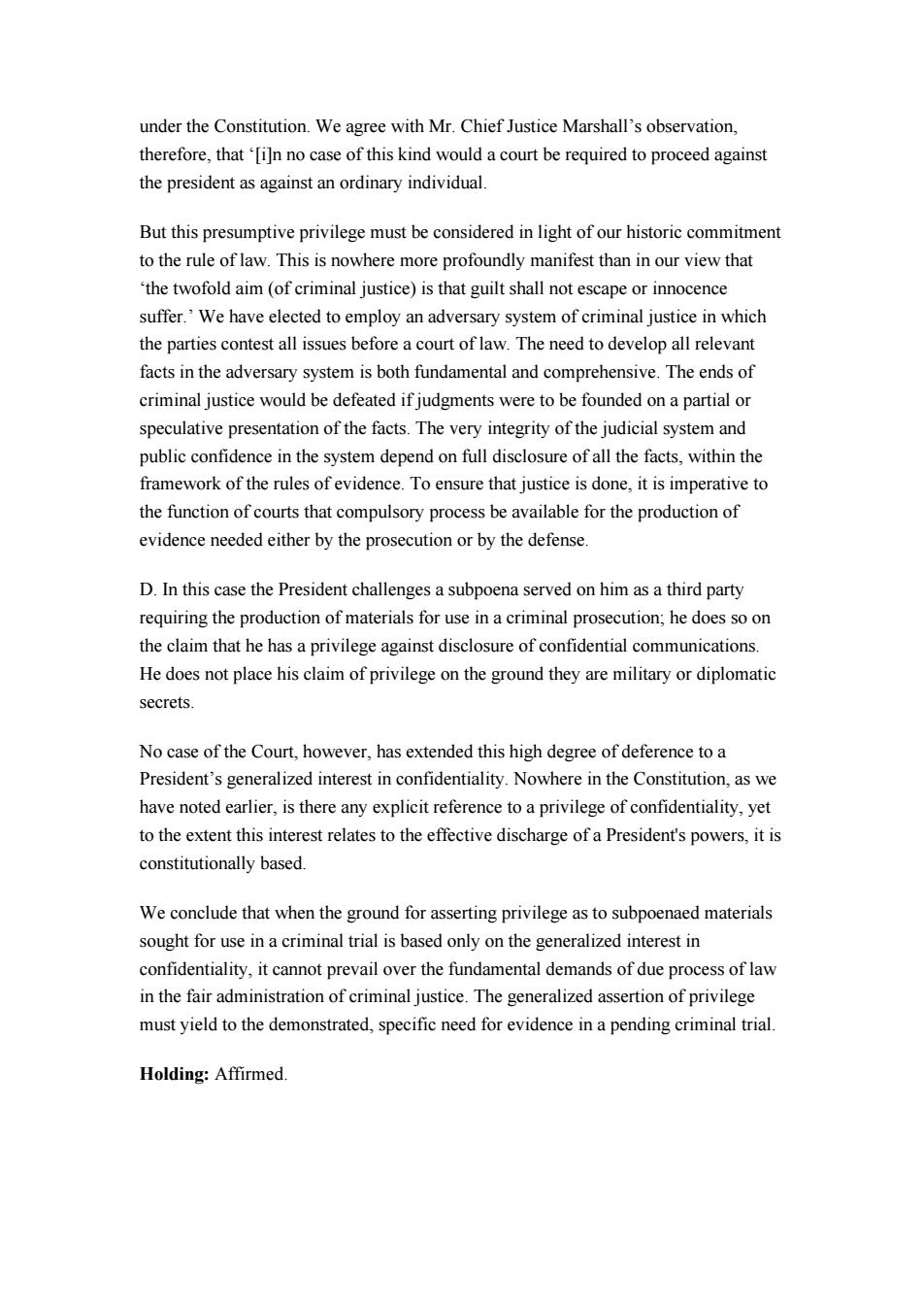
United States v.Nixon 418U.S.683(1974) Facts: On March 1,1974,a federal grand jury sitting in the District of Columbia investigating Watergate returned indictments against former Attorney General John Mitchell and six other individuals,alleging conspiracy to defraud the United States and obstruction of justice.The Special Prosecutor,Leon Jaworski,had reservations as to whether a sitting President could be indicted without first being impeached and removed from office.Jaworski thus persuaded the grand jury to instead name President Nixon as an "unindicted co-conspirator".On April 18 Jaworski sought and District Judge John Sirica issued a subpoena duces tecum directed at the President as a third party to produce certain tape recordings of conversations with specifically named advisors and aides on particular dates and other memoranda then in his possession relevant to the upcoming trials of those indicted.The President challenged the subpoena on the grounds of executive privilege.The constitutionality of the subpoena was affirmed on appeal (Nixon v.Sirica 487 F.2d 700 (D.C.Cir.1973)).On April 30,the President released to the public edited transcripts of 43 conversations,20 of which had been subpoenaed.The President declined to release additional material and through his counsel,James St.Clair,moved to quash the subpoena,asserting that the dispute did not properly lie before the district court because the controversy was nonjusticiable(involving what was purported to be a purely internal dispute between a superior officer and his subordinate within the executive branch).It was also claimed any judicial action in the matter was precluded by the claim of executive privilege The district court rejected the first argument made by the President,relying upon a special regulation concerning the independence of the Special Prosecutor declared by the Attorney General.That court also rejected the second argument by citing the ruling of the US court of Appeals for the District of Columbia in Nixon vs.Sirica Further,the district court denied the President's motion to expunge the grand jury's characterization of him as a co-conspirator.The President then appealed to the US Circuit Court of Appeals.At the same time,the Special Prosecutor petitioned the Supreme Court for certiorari in the interest of facilitating a definitive resolution to the controversy.The Supreme Court granted the writ before any decision could be rendered by the Court of Appeals,and it heard oral arguments in a special session, July 8,1974,following the end of the October 1973 term
United States v. Nixon 418 U.S. 683 (1974) Facts: On March 1, 1974, a federal grand jury sitting in the District of Columbia investigating Watergate returned indictments against former Attorney General John Mitchell and six other individuals, alleging conspiracy to defraud the United States and obstruction of justice. The Special Prosecutor, Leon Jaworski, had reservations as to whether a sitting President could be indicted without first being impeached and removed from office. Jaworski thus persuaded the grand jury to instead name President Nixon as an "unindicted co-conspirator". On April 18 Jaworski sought and District Judge John Sirica issued a subpoena duces tecum directed at the President as a third party to produce certain tape recordings of conversations with specifically named advisors and aides on particular dates and other memoranda then in his possession relevant to the upcoming trials of those indicted. The President challenged the subpoena on the grounds of executive privilege. The constitutionality of the subpoena was affirmed on appeal (Nixon v. Sirica 487 F. 2d 700 (D.C. Cir. 1973)). On April 30, the President released to the public edited transcripts of 43 conversations, 20 of which had been subpoenaed. The President declined to release additional material and through his counsel, James St. Clair, moved to quash the subpoena, asserting that the dispute did not properly lie before the district court because the controversy was nonjusticiable (involving what was purported to be a purely internal dispute between a superior officer and his subordinate within the executive branch). It was also claimed any judicial action in the matter was precluded by the claim of executive privilege. The district court rejected the first argument made by the President, relying upon a special regulation concerning the independence of the Special Prosecutor declared by the Attorney General. That court also rejected the second argument by citing the ruling of the US court of Appeals for the District of Columbia in Nixon vs. Sirica. Further, the district court denied the President's motion to expunge the grand jury's characterization of him as a co-conspirator. The President then appealed to the US Circuit Court of Appeals. At the same time, the Special Prosecutor petitioned the Supreme Court for certiorari in the interest of facilitating a definitive resolution to the controversy. The Supreme Court granted the writ before any decision could be rendered by the Court of Appeals, and it heard oral arguments in a special session, July 8, 1974, following the end of the October 1973 term

Issue: Does the doctrine of separation of powers or the generalized need for confidentiality of Presidential-level communication sustain an absolute Presidential privilege of immunity from judicial process under all circumstances? Rule:Fed.R.Crim.Proc.17(c)and Art.III Reasoning: A.[Wle turn to the claim that the subpoena should be quashed because it demands 'confidential conversations between a President and his close advisors that it would be inconsistent with the public interest to produce.'The first contention is a broad claim that the separation of powers doctrine precludes judicial review of a President's claim of privilege.The second contention is that if he does not prevail on the claim of absolute privilege,the court should hold as a matter of constitutional law that the privilege prevails over the subpoena duces tecum. In the performance of assigned constitutional duties each branch of the Government must initially interpret the Constitution,and the interpretation of its powers by any branch is due great respect from the others.The President's counsel reads the Constitution as providing an absolute privilege of confidentiality for all Presidential communications.Many decisions of this Court,however,have unequivocally reaffirmed the holding of Marbury v.Madison,that'[ilt is emphatically the province and duty of the judicial department to say what the law is.' No holding of the Court has defined the scope of judicial power specifically relating to the enforcement of a subpoena for confidential Presidential communications for use in a criminal prosecution,but other exercises of power by the Executive Branch and the Legislative Branch have been found invalid as in conflict with the Constitution. We therefore reaffirm that it is the province and duty of this Court 'to say what the law is'with respect to the claim of privilege presented in this case.Marbury v. Madison. B.In support of his claim of absolute privilege,the President's counsel urges the valid need for protection of communications between high Government officials and those who advise and assist them in the performance of their manifold duties;the importance of this confidentiality is too plain to require further discussion.Human experience teaches that those who expect public dissemination of their remarks may well temper candor with a concern for appearances and for their own interests to the
Issue: Does the doctrine of separation of powers or the generalized need for confidentiality of Presidential-level communication sustain an absolute Presidential privilege of immunity from judicial process under all circumstances? Rule: Fed.R.Crim.Proc. 17(c) and Art. III Reasoning: A. [W]e turn to the claim that the subpoena should be quashed because it demands ‘confidential conversations between a President and his close advisors that it would be inconsistent with the public interest to produce.’ The first contention is a broad claim that the separation of powers doctrine precludes judicial review of a President’s claim of privilege. The second contention is that if he does not prevail on the claim of absolute privilege, the court should hold as a matter of constitutional law that the privilege prevails over the subpoena duces tecum. In the performance of assigned constitutional duties each branch of the Government must initially interpret the Constitution, and the interpretation of its powers by any branch is due great respect from the others. The President’s counsel reads the Constitution as providing an absolute privilege of confidentiality for all Presidential communications. Many decisions of this Court, however, have unequivocally reaffirmed the holding of Marbury v. Madison, that ‘[i]t is emphatically the province and duty of the judicial department to say what the law is.’ No holding of the Court has defined the scope of judicial power specifically relating to the enforcement of a subpoena for confidential Presidential communications for use in a criminal prosecution, but other exercises of power by the Executive Branch and the Legislative Branch have been found invalid as in conflict with the Constitution. We therefore reaffirm that it is the province and duty of this Court ‘to say what the law is’ with respect to the claim of privilege presented in this case. Marbury v. Madison. B. In support of his claim of absolute privilege, the President’s counsel urges the valid need for protection of communications between high Government officials and those who advise and assist them in the performance of their manifold duties; the importance of this confidentiality is too plain to require further discussion. Human experience teaches that those who expect public dissemination of their remarks may well temper candor with a concern for appearances and for their own interests to the

detriment of the decisionmaking process.Whatever the nature of the privilege of confidentiality of Presidential communications in the exercise of Art.II powers,the privilege can be said to derive from the supremacy of each branch within its own assigned area of constitutional duties.Certain powers and privileges flow from the nature of enumerated powers;the protection of the confidentiality of Presidential communications has similar constitutional underpinnings. The second ground asserted by the President's counsel rests on the doctrine of separation of powers.Here it is argued that the independence of the Executive Branch within its own sphere,insulates a President from a judicial subpoena in an ongoing criminal prosecution,and thereby protects confidential Presidential communications. However,neither the doctrine of separation of powers,nor the need for confidentiality of high-level communications,without more,can sustain an absolute,unqualified Presidential privilege of immunity from judicial process under all circumstances.The President's need for complete candor and objectivity from advisers calls for great deference from the courts.However,when the privilege depends solely on the broad, undifferentiated claim of public interest in the confidentiality of such conversations,a confrontation with other values arises.Absent a claim of need to protect military, diplomatic,or sensitive national security secrets,we find it difficult to accept the argument that even the very important interest in confidentiality of Presidential communications is significantly diminished by production of such material for in camera inspection with all the protection that a district court will be obliged to provide C.Since we conclude that the legitimate needs of the judicial process may outweigh Presidential privilege,it is necessary to resolve those competing interests in a manner that preserves the essential functions of each branch. The expectation of a President to the confidentiality of his conversations and correspondence,like the claim of confidentiality of judicial deliberations,for example, has all the values to which we accord deference for the privacy of all citizens and, added to those values,is the necessity for protection of the public interest in candid, objective,and even blunt or harsh opinions in Presidential decisionmaking.A President and those who assist him must be free to explore alternatives in the process of shaping policies and making decisions and to do so in a way many would be unwilling to express except privately.These are the considerations justifying a presumptive privilege for Presidential communications.The privilege is fundamental to the operation of Government and inextricably rooted in the separation of powers
detriment of the decisionmaking process. Whatever the nature of the privilege of confidentiality of Presidential communications in the exercise of Art. II powers, the privilege can be said to derive from the supremacy of each branch within its own assigned area of constitutional duties. Certain powers and privileges flow from the nature of enumerated powers; the protection of the confidentiality of Presidential communications has similar constitutional underpinnings. The second ground asserted by the President’s counsel rests on the doctrine of separation of powers. Here it is argued that the independence of the Executive Branch within its own sphere, insulates a President from a judicial subpoena in an ongoing criminal prosecution, and thereby protects confidential Presidential communications. However, neither the doctrine of separation of powers, nor the need for confidentiality of high-level communications, without more, can sustain an absolute, unqualified Presidential privilege of immunity from judicial process under all circumstances. The President’s need for complete candor and objectivity from advisers calls for great deference from the courts. However, when the privilege depends solely on the broad, undifferentiated claim of public interest in the confidentiality of such conversations, a confrontation with other values arises. Absent a claim of need to protect military, diplomatic, or sensitive national security secrets, we find it difficult to accept the argument that even the very important interest in confidentiality of Presidential communications is significantly diminished by production of such material for in camera inspection with all the protection that a district court will be obliged to provide C. Since we conclude that the legitimate needs of the judicial process may outweigh Presidential privilege, it is necessary to resolve those competing interests in a manner that preserves the essential functions of each branch. The expectation of a President to the confidentiality of his conversations and correspondence, like the claim of confidentiality of judicial deliberations, for example, has all the values to which we accord deference for the privacy of all citizens and, added to those values, is the necessity for protection of the public interest in candid, objective, and even blunt or harsh opinions in Presidential decisionmaking. A President and those who assist him must be free to explore alternatives in the process of shaping policies and making decisions and to do so in a way many would be unwilling to express except privately. These are the considerations justifying a presumptive privilege for Presidential communications. The privilege is fundamental to the operation of Government and inextricably rooted in the separation of powers

under the Constitution.We agree with Mr.Chief Justice Marshall's observation, therefore,that'[i]n no case of this kind would a court be required to proceed against the president as against an ordinary individual. But this presumptive privilege must be considered in light of our historic commitment to the rule of law.This is nowhere more profoundly manifest than in our view that the twofold aim (of criminal justice)is that guilt shall not escape or innocence suffer.'We have elected to employ an adversary system of criminal justice in which the parties contest all issues before a court of law.The need to develop all relevant facts in the adversary system is both fundamental and comprehensive.The ends of criminal justice would be defeated if judgments were to be founded on a partial or speculative presentation of the facts.The very integrity of the judicial system and public confidence in the system depend on full disclosure of all the facts,within the framework of the rules of evidence.To ensure that justice is done,it is imperative to the function of courts that compulsory process be available for the production of evidence needed either by the prosecution or by the defense. D.In this case the President challenges a subpoena served on him as a third party requiring the production of materials for use in a criminal prosecution;he does so on the claim that he has a privilege against disclosure of confidential communications. He does not place his claim of privilege on the ground they are military or diplomatic secrets No case of the Court,however,has extended this high degree of deference to a President's generalized interest in confidentiality.Nowhere in the Constitution,as we have noted earlier,is there any explicit reference to a privilege of confidentiality,yet to the extent this interest relates to the effective discharge of a President's powers,it is constitutionally based. We conclude that when the ground for asserting privilege as to subpoenaed materials sought for use in a criminal trial is based only on the generalized interest in confidentiality,it cannot prevail over the fundamental demands of due process of law in the fair administration of criminal justice.The generalized assertion of privilege must yield to the demonstrated,specific need for evidence in a pending criminal trial. Holding:Affirmed
under the Constitution. We agree with Mr. Chief Justice Marshall’s observation, therefore, that ‘[i]n no case of this kind would a court be required to proceed against the president as against an ordinary individual. But this presumptive privilege must be considered in light of our historic commitment to the rule of law. This is nowhere more profoundly manifest than in our view that ‘the twofold aim (of criminal justice) is that guilt shall not escape or innocence suffer.’ We have elected to employ an adversary system of criminal justice in which the parties contest all issues before a court of law. The need to develop all relevant facts in the adversary system is both fundamental and comprehensive. The ends of criminal justice would be defeated if judgments were to be founded on a partial or speculative presentation of the facts. The very integrity of the judicial system and public confidence in the system depend on full disclosure of all the facts, within the framework of the rules of evidence. To ensure that justice is done, it is imperative to the function of courts that compulsory process be available for the production of evidence needed either by the prosecution or by the defense. D. In this case the President challenges a subpoena served on him as a third party requiring the production of materials for use in a criminal prosecution; he does so on the claim that he has a privilege against disclosure of confidential communications. He does not place his claim of privilege on the ground they are military or diplomatic secrets. No case of the Court, however, has extended this high degree of deference to a President’s generalized interest in confidentiality. Nowhere in the Constitution, as we have noted earlier, is there any explicit reference to a privilege of confidentiality, yet to the extent this interest relates to the effective discharge of a President's powers, it is constitutionally based. We conclude that when the ground for asserting privilege as to subpoenaed materials sought for use in a criminal trial is based only on the generalized interest in confidentiality, it cannot prevail over the fundamental demands of due process of law in the fair administration of criminal justice. The generalized assertion of privilege must yield to the demonstrated, specific need for evidence in a pending criminal trial. Holding: Affirmed